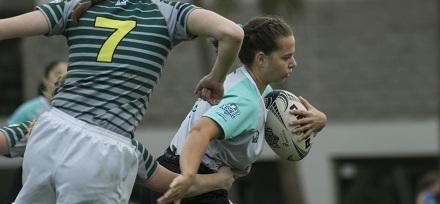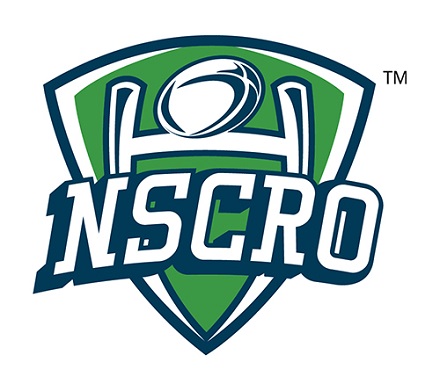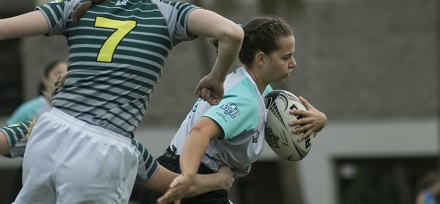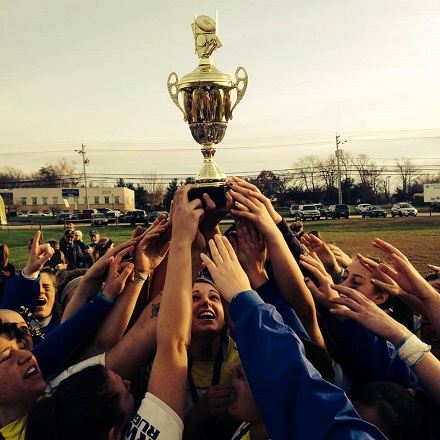
 The National Small College Rugby Organization(pronounced “N”-SCRO) was founded in 2007 to organize the Division III and Division IV college rugby national playoff system. Its championships have become a vital part in developing collegiate rugby in the U.S. and are now known as the Small College National Championships.
The National Small College Rugby Organization(pronounced “N”-SCRO) was founded in 2007 to organize the Division III and Division IV college rugby national playoff system. Its championships have become a vital part in developing collegiate rugby in the U.S. and are now known as the Small College National Championships.
Comprised of nearly 400 men’s and women’s college rugby clubs who participate in more than 30 leagues, NSCRO provides an opportunity for these programs to showcase their abilities to a broader audience with a chance at a national title and ranking. Along with recognizing club and player success on and off the field, the increased visibility NSCRO creates has led to improved school support, greater on-campus interest in rugby, and growth in financial support and alumni involvement.
In late 2012, NSCRO and USA Rugby reached an agreement that provides NSCRO with USA Rugby’s support and recognition of NSCRO as an independent organization, sharing similar goals for bettering the collegiate rugby experience.

NSCRO holds its National Championships at outstanding venues. The NSCRO men’s National Championship has been held at Infinity Park (in Glendale, Colorado, nicknamed “Rugbytown USA”) and Founders Field near Pittsburgh. Founders Field has also hosted the NSCRO women’s 7s National Championship. Since 2016, NSCRO’s Women's 15s National Championship has been held at the rugby facility at Life University in Marietta, Georgia. NSCRO provides free live streaming of all of its Men’s and Women’s National Championships. NSCRO’s All-Star Championships are held annually. The Women’s 7s event is held in January at Eckerd College in St. Petersburg, Florida, while the Men’s 15s event has been held in partnership with Major League Rugby clubs such as the Austin Elite and Houston Sabercats.
Sports Destination Management: The NSCRO website says you’re accepting bids to host regional men’s 7s qualifying tournaments.
Cohen: Yes – information on hosting either a fall or a spring event is available on our website. For hosting a men’s 7s QT, contact Ron Ziegler at mens7s@nscro.org. For hosting a Spring 15s Region Championship send an e-mail to our director of events, Matt Robinette, at Events@nscro.org. Our men’s fall events have just been awarded. Information is available at https://www.nscro.org/news_article/show/1055295.
 SDM: What are you looking for when it comes to venues?
SDM: What are you looking for when it comes to venues?
Cohen: – Obviously, we need a quality facility with a good playing surface, and one that is the correct size for rugby. The ideal playing surface is grass. Many facilities in many schools now have synthetic turf. We’re not opposed to synthetic turf, though – if the weather is bad, we don’t have to cancel because the field’s not safe to use. Safety is paramount in rugby. We separate our teams from fans so one side of the field is for fans and one is for teams. This way teams can focus on playing and fans on supporting their team.
Outside of that, we want nice amenities and locker rooms for teams to change and shower. Having a facility that provides concessions is good, but alcohol has to be strictly controlled or not served at all.
If we’re looking at places to host one of our national championship events, we’re also going to want to see if cities have an airport that has good access and good rates. NSCRO needs facilities with enough people to staff and help us run the event; we only bring three or four people. We prefer a facility that has a hard-wired internet connection so we can professionally broadcast our matches at high quality; we don’t charge our fans for watching our broadcast, either. We are open to revenue sharing with our ticket sales.
S DM: Rugby is generally considered a club sport, rather than a varsity sport, at most colleges. Do you encourage teams to take responsibility for their own management?
DM: Rugby is generally considered a club sport, rather than a varsity sport, at most colleges. Do you encourage teams to take responsibility for their own management?
Cohen: Yes; one of the things we want to develop is a sense of responsibility for the club. It is our belief that responsible students develop into responsible adults. One of the challenges of building a successful rugby club is that there are some schools insist that the club is solely student run without adult support. This is often a recipe for failure as young adults need guidance and mentorship from older adults to learn how to become a leader and build the club for success. We make it a point to recognize team members who are outstanding leaders at their school and in their community. We have a Student Leader of the Month to honor them and we also recognize clubs for doing community service.
SDM: It sounds like you put a lot of stock in character.
Cohen: We doOur top sponsor is the Penn Mutual Life Insurance Company. Until recently, nobody had heard much about Penn Mutual. What attracted them to rugby was seeing how the values that rugby teaches matched up with Penn Mutual’s corporate values. They believed in team building, in not having a sense of entitlement and in working hard toward a goal. They have a special section on their website now that is devoted to rugby, and there is also a section on the multi-year agreement between NSCRO and Penn Mutual.
 SDM: It sounds like they’re really on board with NSCRO’s mission.
SDM: It sounds like they’re really on board with NSCRO’s mission.
Cohen: They are. Every year, Penn Mutual presents the Penn Mutual Life of Significance Awards to student-athletes participating in the Penn Mutual College Rugby Championships, male and female, who upholds the values of the rugby community and Penn Mutual. The awardees demonstrate integrity, respect, and loyalty—on and off the pitch. It’s an important recognition. In 2019, Penn Mutual recognizes 19 student-athletes and 8 of them were NSCRO players. If you read their announcement, you will understand how college rugby is more than young adults running around a field with a ball in hand.
SDM: What generally gets a team started at a college, if rugby hasn’t been on campus before?
Cohen: Usually, it’s a student who played in high school and doesn’t want to stop playing. More recently we are seeing schools who are looking for a way to improve enrollment turning to starting a well-supported rugby program. Doing so will attract high school players who want to continue playing rugby in college.
SDM: Is there a specific type of school where rugby seems to be growing?
 Cohen: There are literally thousands of small colleges around the country that don’t have rugby and we see that as a tremendous growth opportunity. I would say the schools where we see it popping up more often are the faith-based schools who recognize how their values and beliefs closely align with rugby if it is done right.
Cohen: There are literally thousands of small colleges around the country that don’t have rugby and we see that as a tremendous growth opportunity. I would say the schools where we see it popping up more often are the faith-based schools who recognize how their values and beliefs closely align with rugby if it is done right.
SDM: Rugby is a contact sport. Are there concerns about safety?
Cohen: It’s a contact sport but what sets rugby apart from American football is the tackling technique – which is much safer especially in terms of minimizing head trauma injuries. Many college and professional football teams have started teaching the rugby form of tackling.
SDM: Despite that, is the competition fierce at the championship level?
Cohen: Yes. But rugby has an intensity that teaches athletes how to play hard with sportsmanship win or lose. One interesting way is how rugby builds character. This is often seen in the third-place match at a Championship event. How will teams respond after losing the semifinal match? Do they play with their heads held high or with their tails between their legs? How they play this match is a statement of the character instilled in them by their coach. When a rugby match is over, players on both teams are congratulating each other because they know they played as best they could. As some may say ‘they left it all on the field’.

